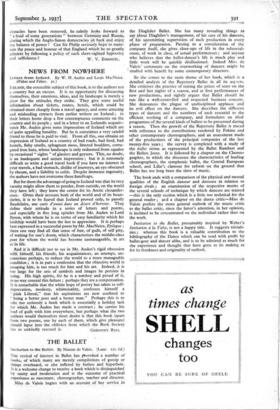NEWS FROM NOWHERE
Letters from Iceland. By W. H. Auden and Louis MsesTeice. (Faber and Faber. cis.) ICELAND, the ostensible subject of this book, is to the authors not a country but an excuse. It is an opportunity for discussing themselves, their emotions, ideas, and its landscape is merely a decor for the attitudes they strike. They give some useful information about tickets, routes, hotels, which could be obtained more cheaply from a travel agency, and some amusing and misleading extracts from earlier writers on Iceland ; in their letters home drop a few contemptuous comments on the country and its people ; and in a letter to an Icelandic acquain- tande Mr. Auden gives some impressions of Iceland which are of quite appalling banality. But he is sometimes a very candid friend to those he is paid to visit. From all this, one obtains an impression of Iceland as a country of bad roads, bad food, bad hostels, fishy smells, sphagnum moss, littered boulders, corru- gated iron huts, whose landscape is only redeemed from squalor by occasional " sights " of glaciers and geysers. This, no doubt, is an inadequate and unjust impression ; but it is extremely difficult to write a good travel book if you have no interest in your travels, a bad stomach, dislike of journeys, an eye obscured by rheum, and a liability to colds. Despite immense ingenuity, the authors have not overcome these handicaps.
But for them the advantage of going to Iceland was that its very vacuity might allow them to ponder, from outside, on the world they have left ; they leave the centre for its Arctic circumfer- ence. Given their account both of the world and of its boun- daries, it is to be feared that Iceland proved only, to parody Baudelaire, une oasis d'ennui dans un desert d'horreur. They define their attitude in a series of letters and poems, and especially in five long epistles from Mr. Auden to Lord Byron, with whom he is on terms of easy familiarity which his lordship would have been the last to appreciate. It is perhaps best expressed in a successful poem by Mr. MacNeice, Epilogue ; there one may find all that sense of fear, of guilt, of self pity, of waiting for one's doom, which characterises the middle-class poet for whom the world has become unmanageable, in art as in life.
And it is difficult not to see in Mr. Auden's rigid obsession with himself, his friends, his acquaintances, an attempt, un- conscious perhaps, to reduce the world to a more manageable condition ; it is in part a confession that the objective world is escaping him, is too much for him and his art. Indeed, it is too large for the sets of symbols and images he persists in using. His high spirits, for he is a tomboy and proud of it, in no way conceal this failure ; perhaps they are a compensation. It is remarkable that the white hope of poetry has taken to self- deprecation, modesty, whimsicality, confesses himself a " pink Liberal," that his aspirations are now confined to " being a better poet and a better man." Perhaps this is to take too seriously a book which is essentially a holiday task for which Mr. Auden has made a contract ; he carries his load of guilt with him everywhere, but perhaps what the two authors would themselves most desire is that this book (apart from two poems, one by each of them, which give pleasure) should lapse into the oblivion from which the Book Society










































 Previous page
Previous page